Key takeaways:
- Code reviews foster collaboration, knowledge sharing, and continuous improvement within development teams.
- Establishing clear guidelines and using checklists can enhance the efficiency and productivity of the code review process.
- Feedback should be constructive, specific, and empathetic to encourage open dialogue and mutual understanding.
- Handling disagreements respectfully and focusing on collaboration can turn conflicts into opportunities for innovation and growth.
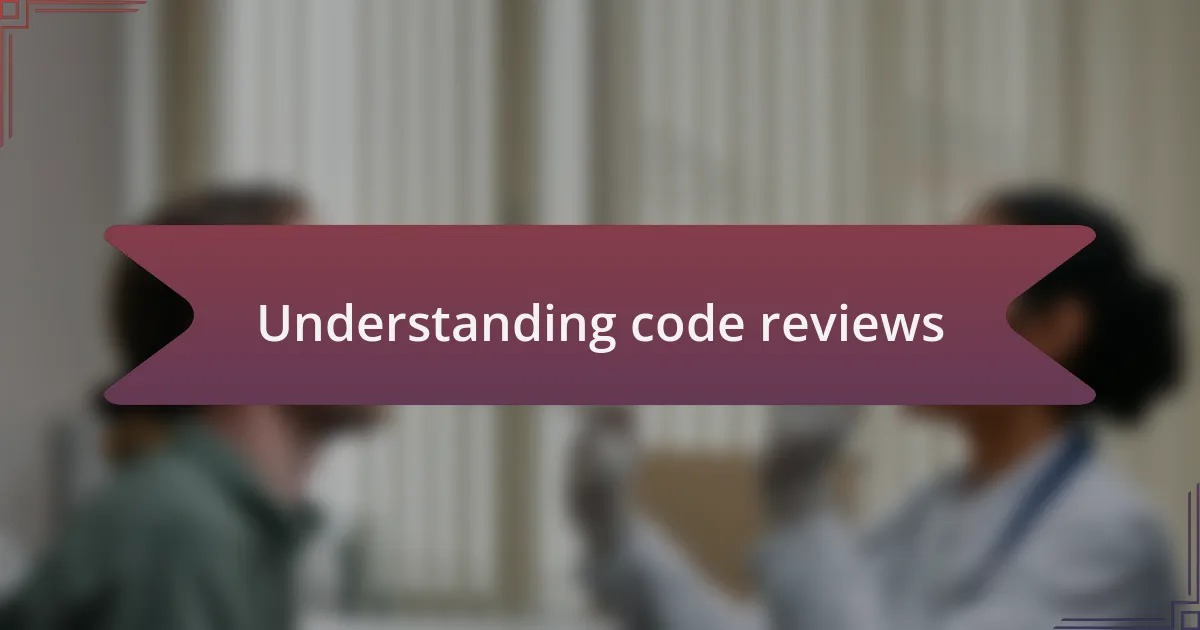
Understanding code reviews
Code reviews serve as a crucial checkpoint in the software development process, allowing teams to collaboratively assess the quality of written code. I remember the first time I participated in a review; it felt a bit daunting, like stepping into the ring to spar with colleagues. Yet, what struck me the most was the camaraderie that blossomed as we dissected each other’s work, turning potential pitfalls into learning opportunities.
At their core, code reviews are about more than just finding bugs; they foster a culture of shared knowledge and continuous improvement. Have you ever had a “lightbulb moment” during a review when someone pointed out an alternative way to solve a problem? I certainly have. Those moments not only helped me grow as a developer but also reinforced the importance of collaboration in a team setting.
Embracing a constructive mindset during code reviews is vital. When I started out, I was often defensive about my code, viewing feedback as criticism instead of a pathway for growth. This shift in perspective transformed my approach, making me realize that every comment was an opportunity to enhance my skills and contribute positively to the team’s success. So, how can we encourage that mindset in our teams?
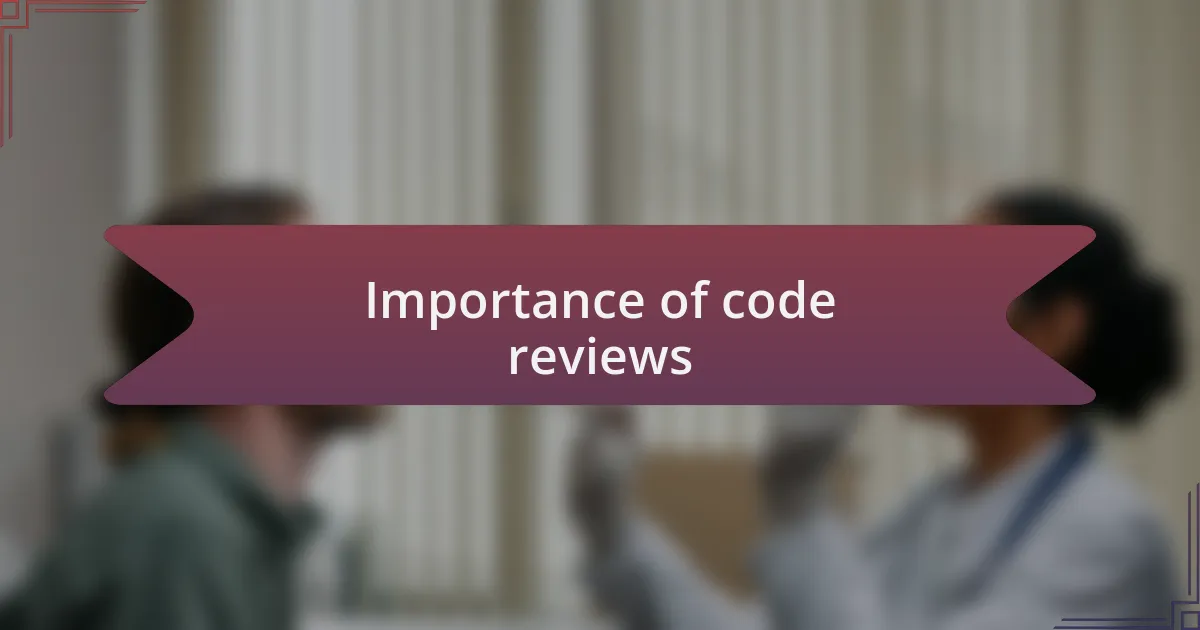
Importance of code reviews
The significance of code reviews cannot be overstated; they serve as a safeguard against costly mistakes down the line. I recall a project where a missing semicolon led to a cascade of errors that could have been easily caught during a review. It made me appreciate how even small eyes can catch the minute details that might elude the original author, preventing future chaos.
Not only do code reviews catch errors, but they also empower less experienced developers to learn from their more seasoned peers. I remember mentoring a junior developer during a review, and seeing the spark of understanding in their eyes when I explained a more efficient algorithm. Those moments reinforce a sense of community and trust within the team, making everyone feel valued and engaged in the process.
Moreover, code reviews enhance overall code maintainability and readability. I’ve often found myself struggling to decipher poorly documented code from previous projects. Through review processes, we set a standard that encourages everyone to write clear, understandable code, making life easier for our team—and perhaps more importantly, for developers who will work on the code in the future. Isn’t it satisfying to think that our contributions can simplify someone else’s journey?
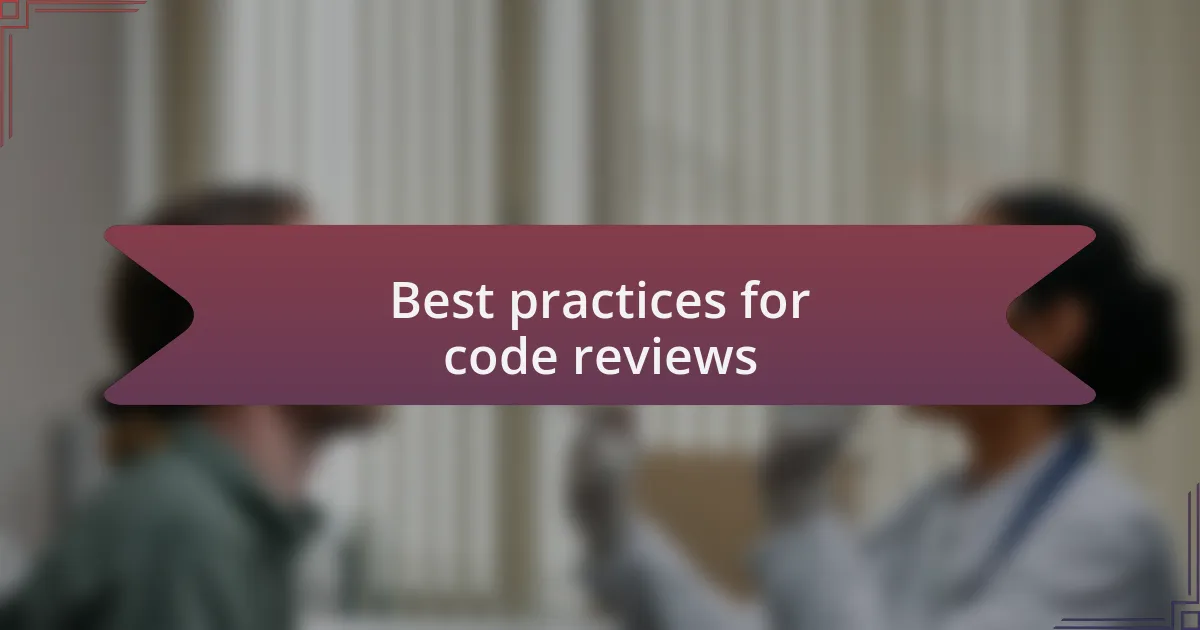
Best practices for code reviews
When conducting a code review, it’s crucial to focus on the code itself, not the person behind it. I remember a time when a peer felt defensive about their contributions simply because the review was too blunt. By maintaining a respectful tone and framing feedback as collaborative problem-solving, I’ve seen the atmosphere shift from one of apprehension to one of partnership. Isn’t it amazing how a little kindness can transform the feedback experience?
Establishing clear guidelines for code reviews can streamline the process and make it more productive. In my experience, I found that having a checklist—covering coding standards, potential bugs, and performance considerations—helped my team stay on track. It not only ensured a systematic review but also empowered team members to contribute effectively, as everyone knew what to look for. Have you ever been in a review where things felt chaotic? That’s precisely what a checklist can help avoid.
Lastly, it’s essential to create a feedback loop that encourages ongoing learning. During one review session, a discussion sparked about alternative solutions to a problem, leading to a mini-workshop that benefited the entire team. Such opportunities for knowledge sharing can be invaluable; they not only improve our current project but also contribute to our growth as developers. How do you foster learning in your reviews? I believe that’s where true growth happens.
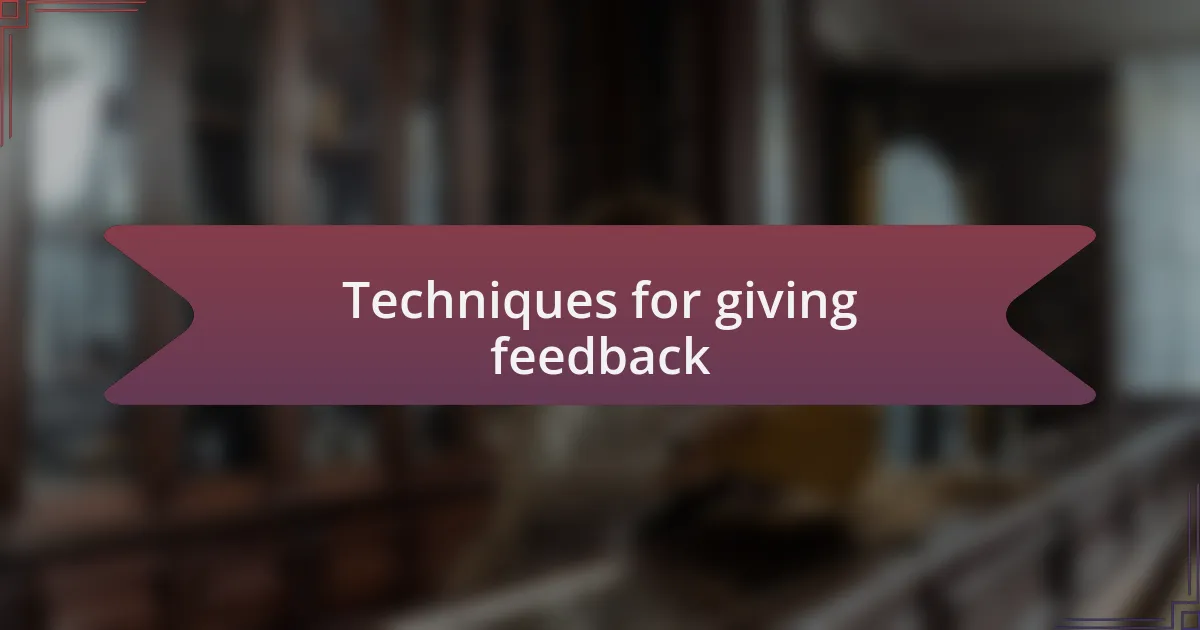
Techniques for giving feedback
Feedback is a delicate balance—requiring both honesty and empathy. I remember one instance where I had to critique a colleague’s algorithm. Instead of just pointing out what was wrong, I shared my own experience with similar issues, which helped create a mutual understanding. Have you ever found that sharing your struggles fosters a more open conversation? It not only softens the blow but also illustrates that everyone, including myself, is a work in progress.
When giving feedback, specificity is key. I once participated in a code review where the comments were vague, leaving the developer frustrated and confused about how to improve. Since then, I’ve made it a point to provide concrete examples, highlighting the exact lines of code that could be optimized or suggesting alternative approaches. Wouldn’t you agree that clarity helps turn confusion into actionable insights? It’s rewarding to see that my detailed observations not only guide others but also facilitate richer discussions.
Encouraging dialogue during feedback sessions can transform the experience for everyone involved. In one memorable review, I asked open-ended questions about a particular design choice that sparked a lively debate. This dynamic exchange not only revealed deeper insights into our thought processes but also made my colleague more receptive to the feedback. How do you create a space for such discussions? I find that fostering an environment where ideas can flow freely leads to more thoughtful and constructive outcomes.

Strategies for handling disagreements
When disagreements arise during a code review, staying calm and addressing the issue head-on can be incredibly effective. I recall a heated discussion about a coding style that one team member was adamant about pursuing, while others preferred a different approach. By listening attentively and validating their perspective, I was able to suggest a compromise that incorporated elements from both sides. Isn’t it amazing how being open to others’ ideas can lead to innovative solutions?
Sometimes, it’s helpful to take a step back and remind everyone involved that the focus is on the code, not on personal attacks. I still remember a review where tensions escalated because a comment was misinterpreted as a slight rather than constructive feedback. By addressing the misunderstanding and emphasizing our shared goal of improving the project, we redirected the conversation towards collaboration. Have you ever seen how quickly frustration can dissipate when the emphasis is placed back on the work itself?
Ultimately, fostering an atmosphere of respect goes a long way in conflict resolution. I always strive to express gratitude for the diverse perspectives that my colleagues bring to discussions. In one instance, after a particularly contentious debate, I made it a point to thank everyone for their input. This simple gesture shifted the mood from adversarial to cooperative, reinforcing that our diverse viewpoints ultimately strengthen our development process. Isn’t it rewarding when a little appreciation can change the entire dynamics of a review session?
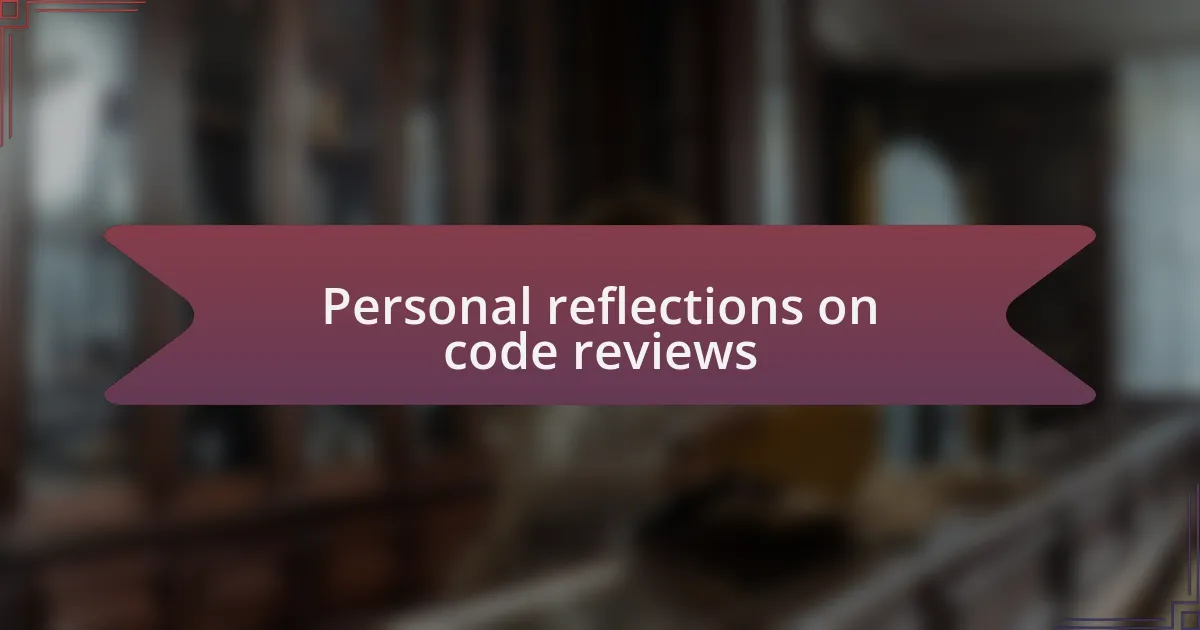
Personal reflections on code reviews
Reflecting on my experiences with code reviews always brings to mind the profound impact they have on both individual developers and the team as a whole. There’s a particular instance that still resonates with me: I participated in a review where my code had a crucial oversight. Instead of feeling defensive, I embraced the feedback. It reinforced my belief that vulnerability in sharing our work can lead to immense personal growth. So, have you felt that exhilarating moment when a simple critique transforms into a pivotal learning opportunity?
When I think back on the early days of my coding career, code reviews often felt daunting. I remember sitting quietly while others dissected my work, a mix of anxiety and anticipation swirling within me. Over time, I discovered that asking questions wasn’t a sign of weakness; it was a pathway to understanding. The more I engaged, the more I realized that this collaborative effort can illuminate areas of improvement I hadn’t even considered. Isn’t it fascinating how each review can be a chance to become a better version of ourselves as developers?
There’s something unique about the camaraderie that forms during code reviews. I often find myself reminiscing about a review session that turned into a brainstorming opportunity, leading to solutions no one had initially expected. We ended up sketching out ideas on a whiteboard, and the energy was infectious. It taught me that the best code reviews can become a fusion of creativity and technical acumen. Have you ever left a review feeling not just accomplished, but genuinely inspired?